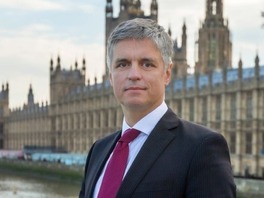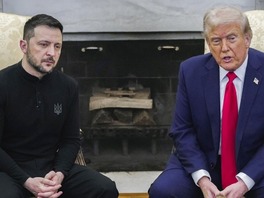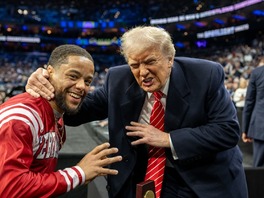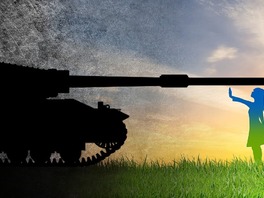The Kremlin is escalating tensions by threatening the UK with potential strikes on its military sites and warning the West of nuclear weapon use. Russia's Defense Ministry announced preparations for nuclear tests, viewing the upcoming transfer of F-16 jets to Ukraine as an introduction of potential nuclear carriers. Amidst these developments, there's increasing discourse among politicians in Ukraine and globally on the potential deployment of foreign forces in Ukraine to counter Russian aggression. For a detailed analysis of these interconnected events, read more in the Apostrophe article.
Diplomatic game with NATO
At the start of this week, contrasting statements emerged, creating a buzz in diplomatic circles. Ukrainian Prime Minister Denys Shmyhal, in a CBC News interview, expressed anticipation for a decision regarding Ukraine's NATO membership application at the upcoming Alliance summit in Washington this July. This statement sharply contrasts with remarks made by NATO Secretary General Jens Stoltenberg during his recent visit to Kyiv, leading to widespread surprise and commentary among analysts.
Ukraine's aspiration to join NATO is enshrined in its Constitution. However, as experts observe, this desire alone is not enough. Decisions regarding membership in the Alliance are taken by its existing members, who are not rushing to welcome Ukraine into their ranks.
The issue of joining NATO became more urgent following the onset of Russia's full-scale invasion. Seven months after the invasion began, in September 2022, Ukraine formally applied for membership. Since then, the country has been in a state of uncertainty. Ukrainian officials had hoped for an invitation to the NATO summit in Vilnius in July 2023, but the invitation did not materialize.
The likelihood of Ukraine not receiving an invitation to join NATO was made explicit by Secretary General Jens Stoltenberg during the Alliance's summit in Washington in July of this year. He clarified this position earlier, during his visit to Kyiv on April 29.
‘This will happen when the time is right, Ukraine will immediately become a member of NATO,’ Stoltenberg commented.
Following Stoltenberg's visit to Kyiv, Ukrainian President Volodymyr Zelenskyi expressed a less optimistic outlook than previously regarding Ukraine's prospects for NATO membership.
‘In my personal opinion, we will only join NATO when we win. I don't believe we will be included in NATO during the war. This poses a risk for some NATO members, while others are simply skeptical about it,’–president said.
‘Today, unfortunately, even the USA and Germany are not yet ready to officially invite Ukraine to the Alliance,’ Professor Andriy Martynov, a leading researcher at the Department of History of International Relations and Foreign Policy of the Institute of History of Ukraine of the National Academy of Sciences of Ukraine, shares these doubts.
‘I wouldn't say that Shmyhal's words contradict the statements of Stoltenberg and Zelensky. Rather, they complement them,’military analyst, reserve colonel Petro Chernyak noted in his commentary to Apostrophe. ‘This is a diplomatic game aimed at raising the stakes. Shmyhal didn't claim that we would be accepted into NATO. He mentioned that Ukraine anticipates a decision concerning the submitted application. This could mean, for instance, that a decision to begin negotiations on joining NATO might be made.’
‘Diplomacy is one thing, actual actions are quite another,’ emphasized the expert.
Military analyst Ivan Stupak is of the same opinion.
‘This is merely a diplomatic maneuver designed to elevate the stakes, so it might be seen as somewhat fantastical. However, Shmyhal was referring more to a technical possibility rather than an immediate reality. We will not be accepted into NATO while the war continues. Countries like Germany, Hungary, and Turkey will oppose it. I believe the most realistic expectation is entry about two years after the war ends, once all the tensions have settled,’ Stupak believes.
Is foreign military in Ukraine feasible.
In the same interview, Denys Shmyhal expressed his support for deploying NATO troops in Ukraine. He believes their presence would help ‘to push back the enemy.’
‘If the time comes, we will be absolutely grateful and delighted,’ he said.
‘However, in my view, this is not fantastical. NATO as an organization and military alliance will not deploy troops under its own banner. Yet, individual NATO member countries have the autonomy to make independent decisions regarding their own troops,’ Stupak suppose.
The expert identifies France as one of the countries that could independently decide to deploy troops.
‘Firstly, President Macron has repeatedly acknowledged the possibility of deploying troops, contingent upon a request from Ukraine. Secondly, a public opinion survey in France revealed that 31% of young French respondents view the potential involvement of French troops alongside Ukraine positively, compared to 17% approval among those aged 50 and above,’ Stupak explains.
The analyst believes that French troops could be stationed along the border with Belarus, thereby freeing up Ukrainian forces currently needed at the front.
It is noteworthy that this issue has been actively discussed by Western partners recently, and not just concerning the French. Previously, Polish Foreign Minister Radosław Sikorski also made various suggestive remarks.
Meanwhile, Hakim Jeffries, the leader of the Democrats in the US House of Representatives, explicitly stated that if Ukraine loses the war against Russia, the US might have to intervene in the conflict not just financially, but also by deploying troops.
'We cannot allow Ukraine to fall. If this happens, there is a significant possibility that America will have to intervene in a conflict not only with our money, but also with our military personnel,’ Jeffries said to CBS News.
According to him, Russian dictator Vladimir Putin is trying to restore the Soviet Union in order to threaten NATO countries.
Putin's potential response
Overall, there has been a noticeable shift in the tone of statements from our Western partners. On May 3, during a surprise visit to Kyiv, British Foreign Secretary David Cameron stated that Ukraine has the right to use weapons supplied by London to target locations inside Russia, a comment that sparked significant uproar in the Kremlin.
In response, Russia resumed its tactic of threatening the West with the "red button." Under orders from President Putin, Russia began preparations for military exercises aimed at practicing the deployment of non-strategic nuclear weapons in the near future.
‘"The training is designed to maintain the readiness of personnel and equipment for the operational deployment of non-strategic nuclear weapons. This preparation is in response to provocative statements and threats from certain Western officials against the Russian Federation, with the ultimate goal of unequivocally ensuring the territorial integrity and sovereignty of the Russian state,’ Russian Ministry of Defense said.
The hysteria at the Russian Ministry of Foreign Affairs escalated. They declared that Russia would regard the presence of F-16 aircraft in Ukraine as equivalent to the arrival of nuclear weapons carriers, irrespective of their specific modifications.
‘American-made F-16 multirole fighter jets are anticipated to be deployed in the Ukrainian theater of operations soon. As noted by the Russian side, the dual-use nature of these aircraft—capable of carrying both non-nuclear and nuclear payloads—cannot be overlooked. For many years, such aircraft have been integral to NATO's "joint nuclear missions." Regardless of the specific modifications of the F-16s delivered, Russia will view them as nuclear weapons carriers and regard this move by the USA and NATO as a deliberate provocation,’ they stated.
Despite the noticeable escalation in Kremlin activities, the analysts remain relatively unperturbed by this latest maneuver from Putin's team.
‘This too is part of escalating the stakes. There's a diplomatic game at play. Western countries are discussing the deployment of NATO troops into Ukraine and granting permission to strike targets within Russia using their weapons. And as usual, Putin responds with nuclear threats. However, this time he's not referring to strategic nuclear weapons, but to tactical ones,’ Chernyak explains.
‘I would echo the words of Kuchma: 'it has DO alreadybeen’, political scientist Yevhen Mahda says in a comment, referring to a popular meme in Ukraine from the 2000s; the second president, Leonid Kuchma, criticized the then prime minister Yanukovych with such words for re-reading the same report twice.
‘Putin has threatened the use of nuclear weapons twice in the past year. Previously, the threats involved strategic nuclear weapons. Now, they're with tactical nuclear weapons. While it's important not to underestimate the power of tactical nuclear weapons—they are indeed potent—the Russians clearly understand that since 1945, nuclear weapons have primarily served as tools of deterrence,’ he continues.
‘On one hand, Putin aims to intimidate our military-political leadership and push them towards compromise in negotiations. On the other hand, he must recognize that this approach makes Russia a target for retaliatory strikes. The escalation Putin is counting on could very well backfire, creating significant issues for himself and Russia,’ Mahda stresses.
‘It is evident that the nuclear threat is Putin's potential reaction to the statements from Britain and France. This represents his last resort. It's yet another escalation in the stakes. Let's see what comes of their training exercises’, Stupak concludes.






